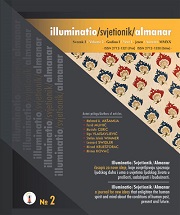Dar kurbanskog mesa. Etnološke refleksije
The gift of qurbani meat. Ethnological reflections
Author(s): Ugo VlaisavljevićSubject(s): Customs / Folklore, Islam studies, Cultural Anthropology / Ethnology, Sociology of Religion
Published by: Centar za dijalog - Vesatijja
Keywords: folk custom; Eid Al-Aḍḥā; Qurbani meat; gift; giftless giving; Allah’s hospitality;
Summary/Abstract: The article considers two customs traditionally followed by Muslims of Bosnia and Herzegovina during Eid Al-Aḍḥā (‘Festival of Sacrifice’ or Kurban Bayram). These are, first, giving a small amount of money, so-called bayramlık, to children as a reward or gift in return for handing out Qurbani meat to neighbors, and, second, giving the meat to non-Muslims. The topic will be explored in the light of Marcel Mauss’s seminal essay on the gift, since Qurbani appears as a gift that identifies, marks and renews the social bonds not only of close relatives, but also of friends and neighbors. In this context too, we will meet what Jacques Derrida calls the aporia of the gift. The slaughtering of Qurbani animal is a true gift, precisely because it is an impossible gift. It may be considered as a giftless giving: although the sacrifice is unthinkable without the slaughtered animal, it cannot be a gift to God. However, after the human act of sacrifice is performed, it is God Who makes the gift to men - because He commands that the victim’s meat must be shared. It is then to be understood not as a returned gift, but as an act of God’s hospitality, which gives to men the very possibility of gift giving. It is argued that the two Bosnian customs draw their ultimate meaning from the divine hospitality vividly experienced in the ritual of sacrifice.
Journal: Illuminatio/Svjetionik/Almanar
- Issue Year: 1/2020
- Issue No: 2
- Page Range: 165-211
- Page Count: 47
- Language: Bosnian, English

